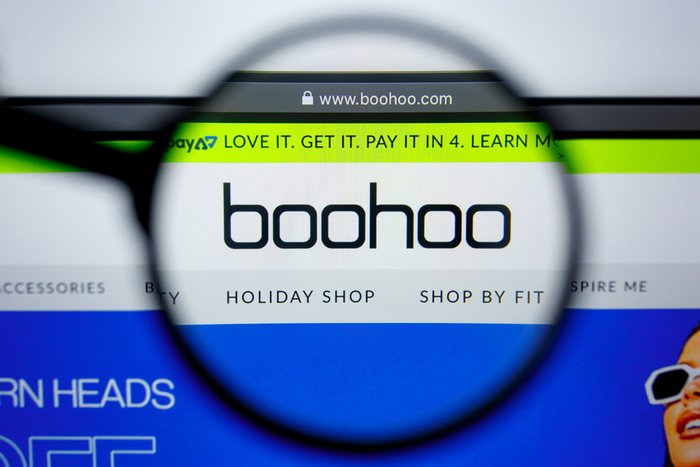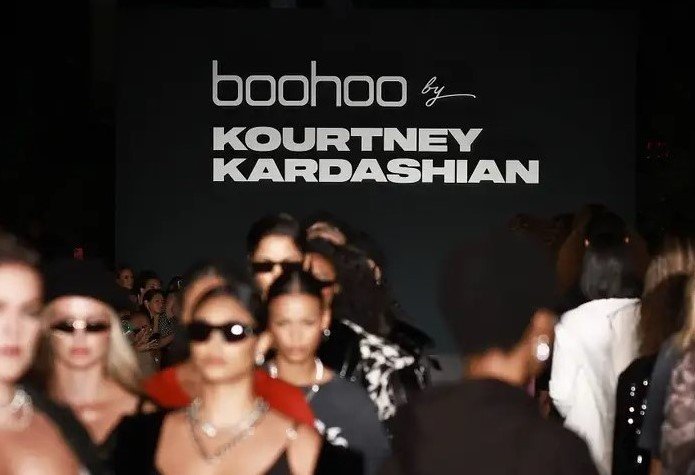Fast-fashion brand Boohoo last week announced details of an unlikely sustainability collaboration with reality star and influencer, Kourtney Kardashian.
The 45-piece ‘sustainable’ collection officially debuted at New York Fashion Week. It featured materials made from ‘recycled fibres, traceable cotton, recycled sequins and recycled polyester’.
Boohoo Group co-founder and executive director Carol Kane said the company had taken the “bold decision” to listen to its customers who favour a move to more sustainable fashion choices.
Although coincidental, the term ‘greenwashing’ was also officially added to the Merriam-Webster Dictionary in the same 48-hour window that the partnership with Kardashian was announced.
The launch it seems played true to Boohoo’s recent history. It came just six weeks after the UK’s Competition and Markets Authority (CMA) confirmed that the brand was under investigation over ‘greenwashing’ and misleading customers in relation to the sustainability credentials of its products.
The CMA investigation is just the latest in a long litany of allegations levelled against the brand, including poor working conditions, and paying workers below the minimum wage in its UK supplier factories.
This unwelcome scrutiny, alongside recent supply chain challenges, has been central to its falling share price, which has dropped by 65% in 2022. Compelled by this backdrop, the brand appears to have belatedly recognised the need to do better, or at least be seen to do better in its ESG and sustainability efforts. However, based on the initial campaign response, its critics aren’t convinced.

Why Kourtney?
So why partner with Kourtney Kardashian? Typically, when a brand partners with a celebrity influencer, they are seeking to leverage their audience channels and subject-matter credibility. In this scenario, the former needs no explaining, but the latter appears a little more curious.
The Kardashians are seen by many as the 21st century embodiment of aspirational consumerism, vast wardrobes, and ethical gymnastics. Kourtney Kardashian was recently named and shamed by California authorities for her excessive home water usage during recent unprecedented drought restrictions in the state. Admittedly, one of the Kardashians’ greatest talents is their ability for re-invention. However, sustainability as a priority appears firmly off the agenda.
In short, both parties’ sustainability credentials are in a net deficit, and Boohoo’s wounded share-price aside, neither appears to be losing much sleep over it. This poses the question of who is leading who on this sustainability journey? And who around the table is there to hold the other accountable?

Starting a conversation
Kourtney Kardashian, for her part, admitted to some reservations on the announcement of the brand collaboration. “When boohoo first approached me with this idea that was all about sustainability and style, I was concerned about the effects of the fast fashion industry on our planet”, said Kardashian.
She added: “There’s still lots of work to be done and improvements to be made, but I truly believe that any progress we can make when it comes to sustainability is a step in the right direction and will open up the conversation for future advancements.”
Boohoo and Kourtney Kardashian have both stated the need to “open up the conversation” and “shine a light on some serious and difficult issues”.
Once upon a time, these platitudes may have provided sufficient wiggle room to get out of a tight corner, but today, the sustainability conversation is fully embedded in our societal discourse, even if some still go to great lengths to look the other way. In other words, we are gone beyond the point of opening up the conversation; we want to hear brands talking about meaningful solutions.
Progress is messy
Admittedly, sustainability is a complicated space. Even the most committed sustainability advocates will acknowledge the challenge of deciphering the authenticity of competing information amidst a lack of information quality control.
In an interconnected world of cross border supply chains, sub-contractors, and outsourcers, it is inevitable that even the most committed brands or businesses won’t always get it right. Progress in this space is often messy, comes with compromise, carrot and stick. Sometimes this means giving brands ample room and guidance to draw a line behind past transgressions to become part of the solution. In other words, moral purity rarely works. However, this only applies if there is an underlying sincerity to a brand’s commitment to change.
The Kourtney Kardashian 45-piece collection accounts for approximately 0.1 per cent of the 40,000 clothing items available on Boohoo each year. Yet, her sustainability endorsement will likely result in an uplift in sales across the entire Boohoo range, and one would expect that this is baked into their calculations.
Boohoo, for its part, clearly knows its customer base. Its ability to weather recent controversy suggests its customers aren’t particularly troubled by the negative headlines or greenwashing accusations.
Therefore, as an outsider looking in, it is difficult to assess how Boohoo will evaluate its recent campaign launch and subsequent criticism. Will the brand view it as a gross miscalculation, a headline-garnering success, or a tick-the-box exercise that affords it a prominent consumer platform to talk about its sustainability ‘journey’, without making any meaningful commitments.
Sustainability and climate change have become the defining challenges of our time. As brands confront the scale of the task at hand, they must be prepared to have the uncomfortable conversations, acknowledge their shortcomings, and ensure their sustainability strategies are anchored in a commitment to measurable, joined-up solutions, and not superficial ‘start a conversation’ soundbites.

With his intelligent communications skillset and extensive media connections, Paddy helps clients build stand-out messaging and achieve their business objectives, whether they’re a start-up raising seed capital or an established player pushing for industry reform or telling their employer brand story. Paddy has been published in a number of national publications, including the Business Post, Irish Independent, Fora.ie, and The42.ie on the theme of strategic communications and reputation management.
(This article was originally published in The Sunday Business Post on 21 September 2022.)
